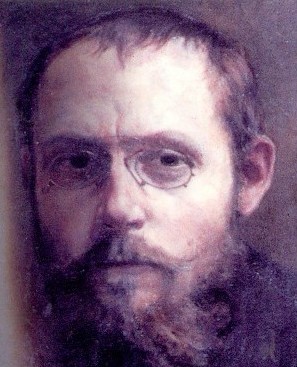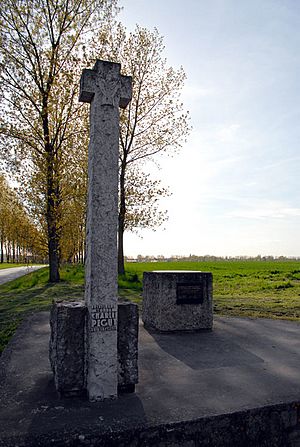Charles Péguy facts for kids
Quick facts for kids
Charles Péguy
|
|
|---|---|

Portrait of Charles Péguy, by
Jean-Pierre Laurens, 1908 |
|
| Born | Charles Pierre Péguy 7 January 1873 Orléans, France |
| Died | 5 September 1914 (aged 41) Villeroy, France |
| Occupation | Writer |
| Nationality | French |
| Alma mater | École Normale Supérieure |
Charles Pierre Péguy (born January 7, 1873 – died September 5, 1914) was a famous French writer. He was known as a poet, an essayist (someone who writes short pieces on different topics), and an editor.
Péguy believed in two main ideas: socialism and nationalism. Socialism is about everyone in society being equal and sharing resources. Nationalism is a strong love for one's country. Later in his life, around 1908, he became a Roman Catholic. His Catholic faith then had a big impact on his writing.
Contents
About Charles Péguy
Charles Péguy was born in Orléans, France. His family was not rich. His father, Désiré Péguy, was a cabinet maker who died when Charles was very young. His mother, Cécile, worked hard mending chairs to support them.
Péguy was a very smart student. He went to a good school called Lycée Lakanal. He even won a scholarship to a famous university, the École normale supérieure (Paris). There, he learned from important thinkers like Henri Bergson.
He left the university without officially graduating in 1897. However, he kept attending some classes. Péguy became a strong supporter of Alfred Dreyfus. This was during the famous Dreyfus Affair, a big political scandal in France.
In 1897, Péguy married Charlotte-Françoise Baudoin. They had four children together. One of his sons was born after Péguy had passed away.
From a young age, Péguy was interested in socialism. He joined the Socialist Party in 1895. In 1900, he started his own literary magazine called Les Cahiers de la Quinzaine. He was the main writer and editor for this magazine until he died in 1914.
At first, his magazine supported the Socialist Party leader, Jean Jaurès. But Péguy later stopped supporting Jaurès. He felt Jaurès was not true to France or to socialist ideas. In his magazine, Péguy published his own poems and essays. He also featured works by other important writers, like Romain Rolland.
One of Péguy's most famous poems is "Portico of the Mystery of the Second Virtue." It has been printed over 60 times in France. Even Charles de Gaulle, a famous French leader, loved this book.
When World War I started, Péguy joined the French army. He became a lieutenant. Sadly, he died in battle on September 5, 1914. He was shot in the forehead near Villeroy, France. This was just one day before the start of the First Battle of the Marne. There is a special memorial near where he died to remember him.
Péguy's Impact
Charles Péguy's writings have influenced many people. During World War II, his words were used by different groups in France.
For example, members of the French Resistance quoted Péguy. The French Resistance was a secret group that fought against the occupation of France. Charles de Gaulle, who led the Resistance, also quoted Péguy in his speeches.
Many famous writers have also been inspired by Péguy. The English novelist Graham Greene mentioned Péguy in his books. Greene even used a quote from Péguy at the beginning of his novel The Heart of the Matter.
A Swiss theologian named Hans Urs von Balthasar also spoke about Péguy's work. A theologian is someone who studies religion. He said that Péguy's character "Eve" showed a deep understanding of God's love.
In 1983, a poet named Geoffrey Hill wrote a poem as a tribute to Péguy. It was called The Mystery of the Charity of Charles Péguy.
Famous Sayings
Charles Péguy is remembered for many wise and thought-provoking quotes. Here are a few of them:
- "The sinner is at the very heart of Christianity. Nobody is so competent as the sinner in matters of Christianity. Nobody, except the saint." (This quote was used by Graham Greene in his novel The Heart of the Matter.)
- "It will never be known what acts of cowardice have been committed for fear of not looking sufficiently progressive." (From Notre Patrie, 1905)
- "Tyranny is always better organised than freedom."
- "There will be things that I do that no one will be left to understand." (From Le Mystère des saints Innocents)
- "Everything begins in mysticism and ends in politics." (From Notre Jeunesse, 1909)
His Works
Péguy wrote many different types of works, including essays, poetry, and plays.
Essays
- (1901). De la Raison (About Reason).
- (1905). Notre Patrie (Our Homeland).
- (1910). Notre Jeunesse (Our Youth).
- (1913). L'Argent (Money).
- (1914). Note sur M. Bergson et la Philosophie Bergsonienne (Note on Mr. Bergson and Bergsonian Philosophy).
Poetry
- (1912). Le Porche du Mystère de la Deuxième Vertu (The Portico of the Mystery of the Second Virtue).
- (1913). La Tapisserie de Sainte Geneviève et de Jeanne d'Arc (The Tapestry of Saint Genevieve and Joan of Arc).
- (1913). Ève (Eve).
Plays
- (1897). Jeanne d'Arc (Joan of Arc).
- (1910). Le Mystère de la Charité de Jeanne d'Arc (The Mystery of the Charity of Joan of Arc).
- (1912). Le Mystère des Saints Innocents (The Mystery of the Holy Innocents).
Works in English
Many of Péguy's works have been translated into English so more people can read them.
- (1943). Basic Verities. Prose and Poetry.
- (1950). The Mystery of the Charity of Joan of Arc.
- (1956). The Mystery of the Holy Innocents.
- (1958). Temporal and Eternal.
- (1970). The Portico of the Mystery of the Second Virtue.
Images for kids
-
Cover of Die Aktion with Péguy's portrait by Egon Schiele
See also
 In Spanish: Charles Péguy para niños
In Spanish: Charles Péguy para niños
 | Lonnie Johnson |
 | Granville Woods |
 | Lewis Howard Latimer |
 | James West |



